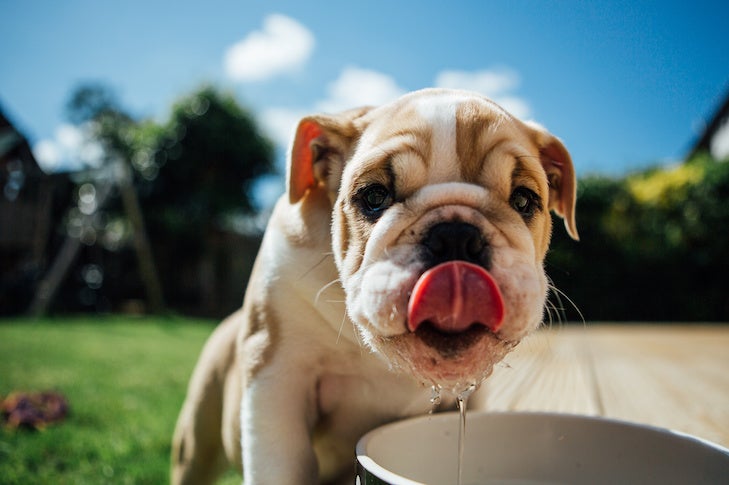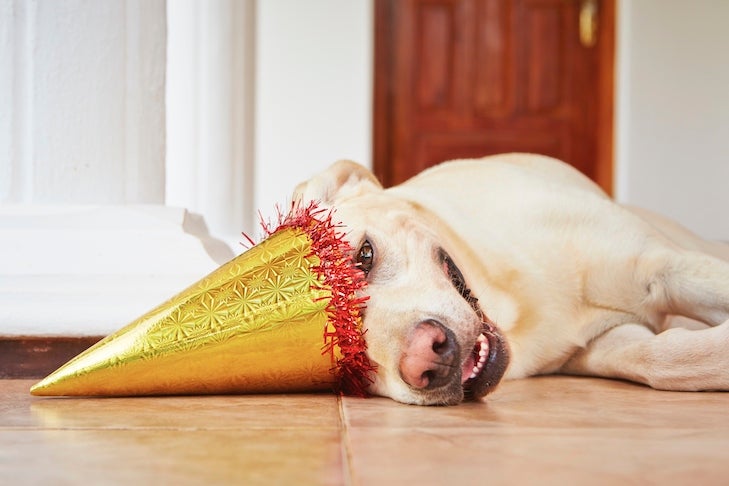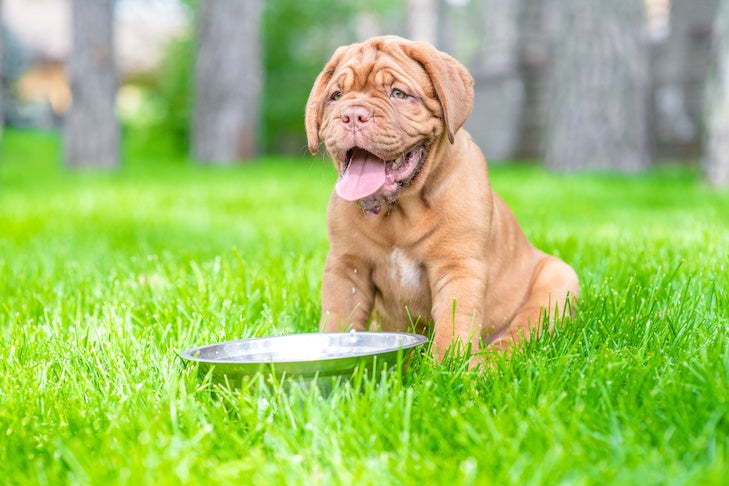
“I host a lot of get-togethers in my home and my dog “works the room” begging for treats. Most of my guests know not to feed him, but I’m nervous he’ll lap up the alcoholic beverages left unattended without my knowledge. How much alcohol is too much? Are some alcohols more dangerous to dogs than others? Lastly, what do I do if my dog does drink alcohol?” -Party Animal
Dear PA: Alcohol toxicity is not as common as you may think, because dogs are not naturally drawn to alcoholic beverages. However, accidents can happen. Just as with humans, the safety issue is not with the type of alcohol your dog consumes but rather, how much was consumed. For example, hard liquor, wine, and craft beer contain higher alcohol levels than lite beer.
If your dog does accidentally consume alcohol, it’s hard to know whether the amount consumed is at dangerous levels. The health and weight of the dog in relation to the type and volume are both variables to consider. For example, for toy breeds, a smaller amount of alcohol would be considered more dangerous than for larger breeds.
The amount of ethanol needed to cause intoxication varies depending on its concentration in the substance ingested. The published oral lethal dose in dogs is 5.5 to 7.9 g/kg of 100% ethanol. One milliliter of ethanol is equal to 0.789 g.

Ethanol Concentrations in Drinks & Household Products
| SUBSTANCE | PROOF | % ETHANOL BY VOLUME | |
| Light beer | 5–7 | 2.5–3.5 | |
| Beer | 8–12 | 4–6 | |
| Ale | 10–16 | 5–8 | |
| Wine | 20–40 | 10–20 | |
| Mouthwash | 14–27 | ||
| Amaretto | 34–56 | 17–28 | |
| Aftershave | 19–90 | ||
| Schnapps | 40–100 | 20–50 | |
| Coffee liqueurs | 42–53 | 21–26.5 | |
| Brandy | 70–80 | 35–40 | |
| Bourbon | 80–90 | 40–45 | |
| Rum | 80–82 | 40–41 | |
| Cognac | 80–82 | 40–41 | |
| Vodka | 80–82 | 40–41 | |
| Whiskey | 80–90 | 40–45 | |
| Tequila | 80–92 | 40–46 | |
| Gin | 80–94 | 40–47 | |
| Cologne/perfume | 50 | ||
| Hand sanitizers | 60–95 | ||
| *For alcoholic beverages, the proof is double the percentage of alcohol present. | |||
Dogs may tend to be more attracted to fruit-based drinks, cocktails, punches, ciders, seltzers, and foods with alcohol as a key ingredient. Another serious consideration is diet alcoholic beverages or other mixers that may contain xylitol, an artificial sweetener, which is highly dangerous (and can be fatal) for dogs.
Signs and Symptoms of Alcohol Toxicity in Dogs
What happens if a dog drinks alcohol? Canines respond to the effects of alcohol much like humans, and the impact is often mild. You should, however, contact your vet, emergency clinic, or Pet Poison Helpline if you have any concerns, to establish if treatment is needed. Anytime your dog does get into alcoholic beverages or foods containing alcohol, look for these key warning signs:
- Depression or lethargy
- Lack of coordination
- Drooling
- Vomiting or retching
- Weakness
- Collapse
- Decreased respiratory rate (breathing more slowly than usual)
- Hypoglycemia (low blood sugar)
- Hypotension (low blood pressure)
- Hypothermia (low body temperature)
You cannot completely control your pet’s environment and what they consume, but education and awareness are the best ways to start to keep your dog healthy.
What Is Dog Beer? Is It Safe For Dogs?
Can dogs drink alcohol? No, they should never drink alcoholic beverages. But craft and large breweries have discovered that when their customers tip back a cold one, they might want their canine buddies to join them with dog-friendly beverages.
But dog beer is not beer as we humans know it. Depending on the brew, the ingredients in dog beers vary. All are alcohol-free, and a major ingredient is water. In addition, they may be composed of bone broth, vegetables (like carrots, corn, and sweet potatoes), fruit, oats or barley, herbs, and sometimes dog-safe nuts.
Some dog beers include glucosamine, believed to support healthy joints, while others incorporate human-grade USDA meat and vitamin B from malt barley for shiny coats. Some manufacturers even produce light dog beer for overweight pets.
Dog beer should not take the place of a balanced meal. Like other dog treats, it should be given within reasonable limits. You can pour dog beer into a bowl to be lapped up or pour it over your dog’s kibble. And while adding glucosamine isn’t harmful, if your dog suffers from joint pain, you should consult your veterinarian.
Is dog beer safe for your dog? Yes, in moderation. You might want to teach your dog a new command…bottoms up!

Can Dogs Drink Beer Brewed for Humans?
Dogs should never drink beer brewed for humans. Beer contains alcohol, and alcohol is toxic for dogs. Even a little beer can cause alcohol poisoning, especially if the dog is small.
A dog may be attracted by beer’s smell or taste, or maybe just because their owner is consuming it. Don’t leave your beer unattended if your dog is around, and when you have company, you might want to keep your dog crated or in another room.
Is Beer Bad for Dogs?
In addition to alcohol, beer may have other ingredients that are toxic to dogs, such as chocolate, coffee, or spices. If your dog accidentally laps some beer out of your mug, call your veterinarian. Be sure to note how much beer your dog consumed. A dog that is showing symptoms of alcohol poisoning should be seen as soon as possible by a veterinarian.

